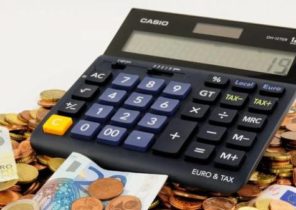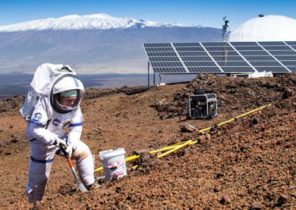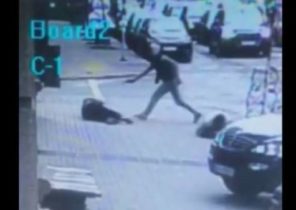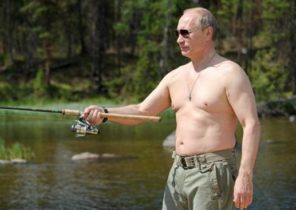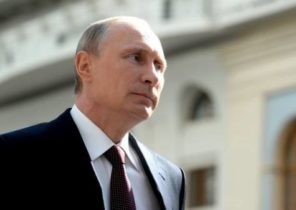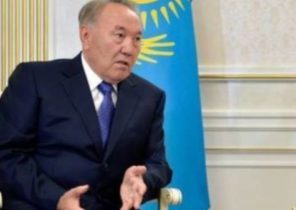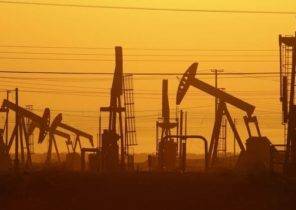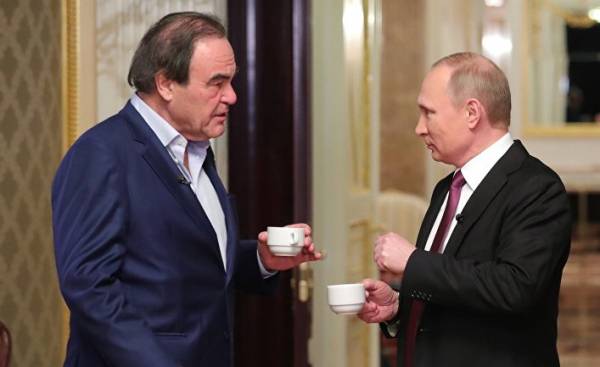
In a new four-part documentary by Oliver stone (Oliver Stone) “Interview with Putin” is at least one truly sincere moment. When Putin shows stone taken from the air footage of tankers IG (banned terrorist organizations — approx.ed.) carrying oil from Syria to Turkey, stone asks, why would Putin with President of Turkey Erdogan is to meet with each other and not to dispel mutual distrust. Putin surprised by this proposal, laughs.
However, most of their conversations quite revealing in another sense. When the second series Putin says stone, the presidential residence is a 20-minute drive from the Kremlin, he forgets to add that he gets so quickly only due to the fact that the police has been clearing his path, blocking traffic, and that the presidential motorcade could rush through the city at 80 miles per hour. And the same applies to almost all words of Putin in this movie. In the best case, each phrase requires a paragraph of notes explaining which facts the Russian President left out of the equation. In the worst case, the facts are in principle not taken into account. Here’s a good example: “we Have hundreds of television companies and radio companies. The state does not control”. Or here’s another: “We never interfere in the internal political processes of other countries.”
Why would Putin say all this? Of course, he doesn’t expect they’ll believe him, though it would be good, too. He is not obliged to support any ideology, as it had to do to the Soviet leadership, forced to lie about everything. Putin’s power is absolute and he can say whatever he pleases. No one in Russia is not shocking to the information that the government controls the media or that Moscow’s bullying and destabilizie other governments.
For Putin, a lie is a show of force. Only the strong lie to get away with. And the bolder the lie, the better you can see that the other person cannot or will not dare to argue.
Easy to see why stone reconciled with the fact that he lied. He needs a good attitude to Putin, to make a film. Harder question about why Putin had paid to stone as much time given that he actually has a country to govern.
We can assume that Putin liked the society of stone — at least at first. Putin, it seems, has a weakness for brutal for an aging big man (think Gerard Depardieu (Gerard Depardieu) and Steven Seagal (Steven Seagal)). Probably the fact that they are as unlike himself — neat, toned ironed. Perhaps Putin also sincerely hoped to learn in the process of talking something new. After all, the wise autocrat should always be open to new ideas, to increase his power and wealth.
However, the stone has nothing to offer him, and for three of the four interview Putin remains only to show off. In a recent interview when the danger of losing access has ceased to be so formidable, stone defiantly back at Putin with questions about intervene if the Russian hackers in the us elections in 2016, and Putin is playing him, making a few angry. But seriously, it obviously did not hurt — he gets the same amount of time to speculate to their hearts content, as for years the United States intervened in Russian elections, funding opposition movements.
Putin knows how to speak convincingly. His arguments make complete sense assuming its the idea that Russia always means well. Do not forget about how much details he owns the material. In all that concerns Russia, Putin, perhaps the most informed person in the world. Still-he need to know the facts so they can be rejected.
In response to awkward questions of Putin stone boldly tells how the Russian Central Bank, explains what the Treaty on the limitation of anti-ballistic missile systems, presents a brief history of the development of Russian nuclear weapons, shares comparative statistics on national defence expenditure in the world and almost goes on to talk about how heated the Kremlin — but luckily, something distracts him.
No awkward questions no sound. Stone was not interested in any abuses during the Chechen wars or the circumstances of the death aircraft Malaysian Airlines, flying in July of 2014 over the Pro-Russian Eastern Ukraine or four explosions of residential buildings in three Russian cities in 1999, seriously contributed to the rise of Putin to the presidency. (Review in 2012 wrote about the reasons to suspect the government of involvement in these attacks.) Question the personal status of Putin rises in a very polite manner, and the President with a smile denies all accusations.
Full of disagreements between Putin and no stone, and interviews often seem a bit too long (if these four hours were cut from the record length in 19 hours, what’s left over?), though never completely uninteresting. In reward for servility stone got what the Kremlin called a “body”, unprecedented for a Western interviewer level. Who knew that Putin has a personal chapel? Or three offices in the Kremlin?
In the film, with a remarkable skill use archive footage. Excerpt from a televised speech, in which Boris Yeltsin on the last day of 1999, announced his retirement, it is literally unbearable to see. Yeltsin barely uttering the words, said to the Russians that he’s leaving. He grunts and sniffs. Already one of this shaking human ruins it explains why the Russian people with such relief, took Vladimir Putin. New President at least was able to walk and to speak coherently.
Compare “Interview with Putin” with frost’s interviews with Nixon in 1977 totally inappropriate. If frost wanted to get Nixon’s admission of guilt in “Watergate”, the stone, it seems, wants to achieve from Putin, nothing special. Moreover, most of the time the stone looks ill-prepared and willing to allow Putin to lead.
However, in fairness, it is unlikely the training could help to discuss with Putin his job because no one outside of the Russian elite really can not imagine how the day of Vladimir Putin and how exactly does the mechanism of its power. As the little man with polished shoes makes you tremble before the country with 144 million people? When Putin invited stone to attend with him — as he claims — daily contact via video link with regional officials and representatives of the Ministry of defence, it is impossible to say whether this exchange is impersonal phrases about the lack of traffic in the Urals Federal district statement or so usually, and operated by Russia.
In interviews with Putin stone almost all the time the United States sends conciliatory signal as the stone later said in an interview with Stephen Alberta (Stephen Colbert). Putin praises of Barack Obama, and John McCain (John McCain) and other American politicians. He talks all the time about a potential “partnership”. His tone is much warmer than one would expect, if you remember, what was the relationship between Russia and America during the period when interviews were recorded, i.e. from July 2015 to February 2017. It was the height of tensions after the flight of Edward Snowden (Edward Snowden) in Moscow, and amid a succession of crises in Ukraine, one of which was associated with the Russian annexation of the Crimea. Moreover, in this time were gaining momentum scandal around sounding address Russia allegations of attempts to influence the election through cyber attacks.
Conversing with a stone, Putin could threaten and blame as he is able to do. Instead, we mostly see the “nice Putin” — adequate and structurally configured, albeit somewhat offended by the fact that outside of Russia, no one knows. The main idea of his speeches is about as follows: “I’m a reasonable man, here’s my position, agree with it, and we can cooperate.”
From the point of view of “nice Putin,” the world’s problems are not with ill will and with errors. He says that America was wrong when I took an extended occupation of Afghanistan and supporting the “Arab spring”. Europe is wrong when it is afraid of Russia, because it confuses Russia with the Soviet Union. Even Russia was once wrong in the past, to Putin. And only Russia is not wrong.
Over time, the importance of “Interview with Putin” are likely to increase — it’s still an extremely rare event, when one changed the world’s leaders for so long speaks to the interviewer. But right now its effect is seriously diminished by events of the past year. In the end, most of the film takes place in a world where U.S. President Barack Obama, his successor is likely to be Hillary Clinton, and the noise around the Russian intervention in the American elections is just beginning to rise. President trump appears only in the fourth and last of the series, and as the unknown variable.
Of course, a lot has changed not only in America. If the stone arrived at the Kremlin last week, he would have to get past the anti-Putin demonstrations under the guidance of the fighter against corruption Alexei Navalny (in Review wrote about them on June 14 Masha Gessen). Stone Putin — still the miracle-worker, which led Russia in order after the chaos of the Yeltsin. However, for most of the last decade the Russian economy undermined the decline in oil prices and the cumulative impact of corruption and nepotism. The success of Bulk clearly show that Putin is tired of the Russians to having the opportunity to throw him a real political challenge. Or at least that such a possibility could occur, if Putin did not control the political process and if the most persistent criticism of Putin had strange habits suddenly die.
The film is a touching moment when Putin recalls how, in 1999, he was appointed acting Prime Minister. According to him, then he thought about one thing: “where to hide the children.” The fact that Russia at that time looked like and to some extent still resembles “the Sopranos” on a larger scale. The enemy that could kill you, but would not have touched this with your family, looked at the time the sample integrity.
In 2001, the concert violinist Vadim Repin at the Moscow Conservatory, I happened to be behind both of Putin’s daughters. Their out — even surrounded by bodyguards looked brave. In those days it was still possible to lay at least some hope in the President who allowed their daughters to go to a public place to listen to Beethoven.
